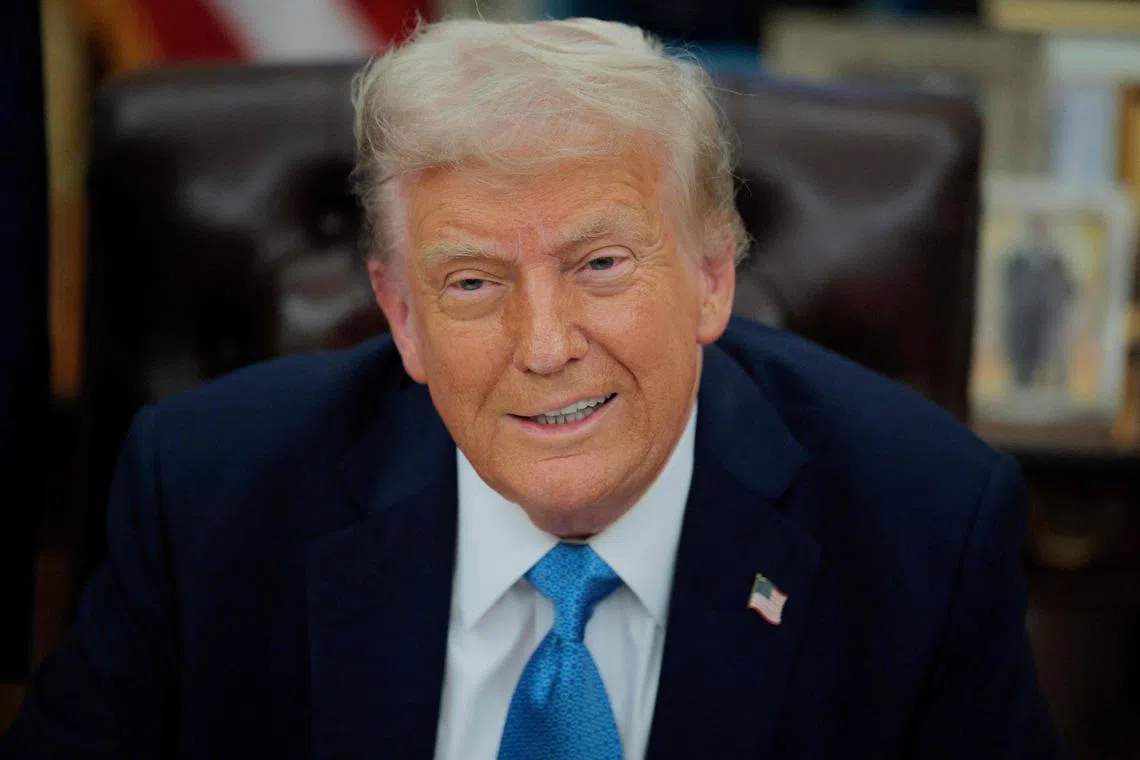News analysis
To Trump, tariffs are not a means but an end
Sign up now: Get ST's newsletters delivered to your inbox

US President Donald Trump believes tariffs will enrich Americans, but critics say he is misreading history.
PHOTO: AFP
PALM BEACH, Florida – Tariffs in the US date back to 1789, when Alexander Hamilton saw them as a solution to two crises facing the newborn republic: a desperate need to raise revenue and a desire to industrialise a nation that seemed dangerously dependent on England.
But in modern times, they have almost always been a negotiating tool – economic coercion in the service of diplomacy, a cudgel to force other nations to the table.
What makes President Donald Trump’s move on Feb 1
For now, at least, the tariffs, in his view, are the point, a means of bolstering the nation’s finances as he simultaneously seeks territorial expansion and strategic advantage over an increasingly assertive China.
He said as much in his inaugural address, only 12 frenetic days earlier.
“Instead of taxing our citizens to enrich other countries,” he said, “we will tariff and tax foreign countries to enrich our citizens.”
He went on to describe his plan to establish an “External Revenue Service”.
A few days ago, he mused to reporters that income taxes might wither away, as tariffs become the main sustenance for America’s US$6.8 trillion (S$9.3 trillion) annual federal budget.
Mainstream economists are largely sceptical of Mr Trump’s faith in tariffs as a game-changing tool for raising revenue or as an effective way of nurturing the return of domestic industries that have withered under global competition.
Indeed, Mr Trump’s approach sounds like a Hamiltonian fantasy, wrapped in an aggressive vision of a world in which America controls Greenland, takes back the Panama Canal
Yet, although it was easy to miss amid all the headlines this past week of freezes on foreign assistance, purges at the Federal Bureau of Investigation, the firing of inspectors-general and efforts to induce the departures of federal workers, Mr Trump kept returning, almost daily, to his belief in tariffs.
He has praised William McKinley, the tariff-loving 25th president, who, for good measure, seized the Philippines, Guam and Puerto Rico in a show of imperialism that marked the US’ emergence as a global power.
Mr Trump described the Gilded Age, from the 1870s to 1910 or so, as the golden era of American industrial might, “the richest our country ever was”.
When Mr Trump talks about that era, he dwells on the US’ prodigious steel production, promising that tariffs will bring it back.
In his description of this golden age, he brushes past the worst abuses of the era, such as the 1892 Homestead steel strike, when Andrew Carnegie and his associate Henry Clay Frick engineered brutal attacks on striking workers.
Nor does he talk about the acute racial and gender discrimination of the era, or the environmental degradation that, over the decades, led to regulation that he has vowed to roll back.
Completing a journey
But in embracing tariffs, Mr Trump is also completing a journey.
No president since World War II has been more determined to scuttle the remnants of globalisation for unvarnished economic nationalism.
His move on Feb 1 even eviscerated the biggest trade deal he negotiated in his first term: the US-Mexico-Canada Agreement, or USMCA, which replaced the North American Free Trade Agreement.
“The USMCA has to do with free trade and no tariffs,” Mexican President Claudia Sheinbaum said on Jan 31. “If this scenario were to occur, it would obviously set aside the trade agreement,” she added with considerable understatement.
Mr Mark Carney, a former central banker who is one of the contenders to replace Mr Justin Trudeau as the leader of Canada’s Liberal Party – and the next prime minister if he wins – was more direct.
He argued that Canada should demand repayment of “subsidies” it gave the US by selling so much of its oil production to American customers at a discount.
Mr Trump’s primary argument for imposing the broad tariffs was the cross-border traffic in fentanyl, whose precursors are largely produced in China, and which make it into the US through drug cartels, among other routes.
Not surprisingly, many economists recoil when they hear Mr Trump talking about tariffs as the solution to America’s trade and industrial challenges, or as a way to punish other nations for the flow of fentanyl into the US.
They contend that he has misread history and ignored the fact that tariff-protected American industries often got lazy, and were later eviscerated by up-and-coming competitors.
The vocal critics have included Mr Larry Summers, the Treasury secretary in the Clinton administration and a leading White House adviser in the Obama administration, and former senator Phil Gramm, a Republican, who was chair of the Senate banking committee.
“Our united opposition to non-defence-related tariffs is based not on our faith in free trade but on evidence that tariffs are harmful to the economy,” they wrote in The Wall Street Journal. “Protective tariffs distort domestic production by inducing domestic producers to commit labour and capital to produce goods and services that could have been acquired more cheaply on the international market.
“In the process, productivity, wages and economic growth fall while prices rise. Tariffs and the retaliation they bring also poison our economic and security alliances.”
Mr Trump seems undisturbed by this critique.
He has convinced himself, his aides say, that whatever retaliatory steps Canada, Mexico and China take, they will ultimately be harmed more than American consumers will.
In his inaugural address, Mr Trump had a prediction: “Massive amounts of money pouring into our Treasury, coming from foreign sources. The American dream will soon be back and thriving like never before.” NYTIMES


